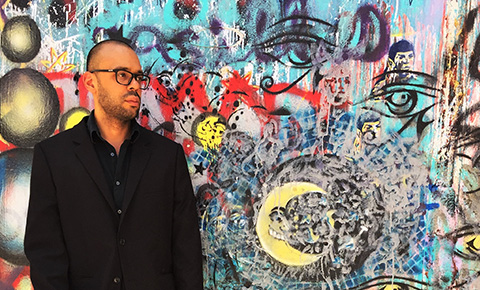Musa al-Gharbi to Deliver Annual Loeschner Lecture

Sociologist Musa al-Gharbi, who argues that many who embrace progressive “social justice” causes actively benefit from and perpetuate the inequalities they decry, is the featured speaker for the 2024 Ray and Nancy Loeschner Lecture Series on Leadership at 7 p.m. Monday, Oct. 21 at Northwestern University.
Al-Gharbi, assistant professor in the School of Communication and Journalism at Stony Brook University in New York, will be interviewed by School of Education and Social Policy Dean Bryan McKinley Jones Brayboy, the Carlos Montezuma Professor.
Their conversation, followed by a book signing, will take place at Northwestern's Segal Visitors Center, 1841 Sheridan Road in Evanston. A brief audience Q&A will follow the main event.
An academic known for coloring outside the lines, al-Gharbi details his provocative observations and describes a new class of people committed to social justice in his forthcoming book, We Have Never Been Woke: The Contradictions of a New Elite.
The members of this new elite, which he calls “symbolic capitalists” work primarily with words, ideas, images and data in consulting, education, law, media, nonprofits, finance and adjacent fields. They are likely to identify as antiracists, feminists, environmentalists, and allies of LGBTQ people, and strongly associate themselves with social justice movements.
But al-Gharbi, who considers himself part of this group, is troubled by what he sees as a fundamental tension. Although sincerely committed to social justice in principle, they also have a strong desire to be elites, and “their egalitarian credentials help them gain more power and status, often at the expense of the marginalized and disadvantaged,” he said.
In We Have Never Been Woke, he describes how social justice language is increasingly used to justify the actions of the new elite—and to portray others as deserving their lot because they think or say the “wrong” things about race, gender, and sexuality. However, the tendency to disparage non-left conservative or religious views is misguided, he said.
“The Americans who are most likely to identify as conservative are racial and ethnic minorities, religious minorities, people who are immigrants, and those from less affluent backgrounds,” he said. “When you create an atmosphere that’s hostile toward socially conservative or religious views, it mostly affects people who are already underrepresented and kind of vulnerable in institutions.”
Al-Gharbi said he isn’t trying to accuse symbolic capitalists of hypocrisy or cynicism. Rather, he looks at how their genuine beliefs prevent them from recognizing how they contribute to social problems—or how their actions regularly provoke backlash against the social justice causes they champion.
Born and raised in a southern Arizona military town, al-Gharbi was interested in questions about theology, the nature of reality, and the meaning of life from an early age—and he still is.
After attending Cochise Community College in Sierra Vista Arizona, al-Gharbi received a bachelor’s degree in Near Eastern studies and a master’s in philosophy at the University of Arizona. In 2023, he earned his doctorate in sociology in at Columbia University.
But his journey was anything but linear. The death of his twin brother, a soldier in the U.S. army who was based in Afghanistan, was one event that profoundly altered his life and thinking. Another was getting “cancelled” by Fox News.
“Existential questions haunt virtually all my work, namely, ‘so what?’ and ‘why does this matter?’” he wrote on his website. “Grappling with these questions gives my scholarship its particular flavor: theoretically-driven, empirically-grounded, and pragmatic in its orientation. It also creates a sense of urgency that drives my productivity.”
His research has analyzed how scholars and journalists think about and discuss race, inequality, social movements, extremism, policing, national security, foreign policy and domestic U.S. political contests.
Al-Gharbi is also the Daniel Bell Research Fellow at Heterodox Academy and served as the group’s director of communications from 2016-2020. A prolific writer, he has been a columnist for Compact Magazine, The Guardian, Salon and Al-Jazeera America and has produced freelance work with the New York Times, Washington Post, The Atlantic, The Nation, New Republic and many other outlets.
About the Loeschner Lecture Series on Leadership
Established in 2013 by a gift from School of Education and Social Policy alumnus Ray Loeschner, the Nancy and Ray Loeschner Lecture Series on Leadership presents visionary leaders in education and other fields. Loeschner is the former president of Olivet University and a pioneer in higher education. In 2006 he received the Northwestern University Alumni Association Alumni Merit Award for the School of Education and Social Policy.